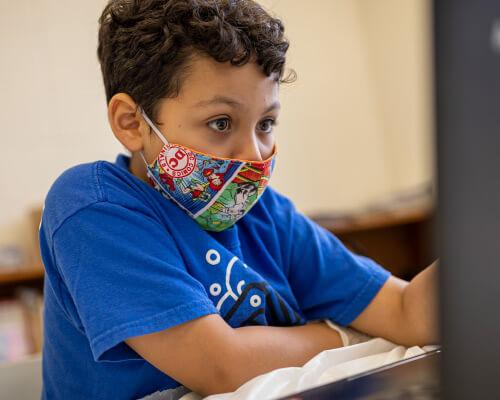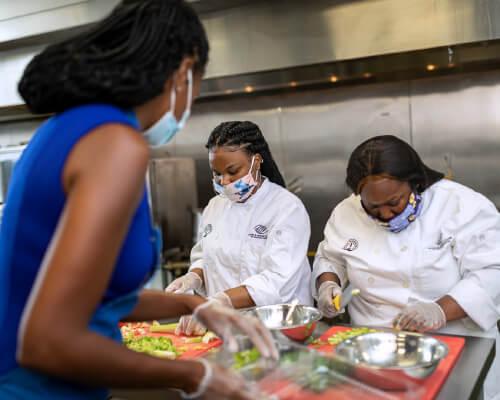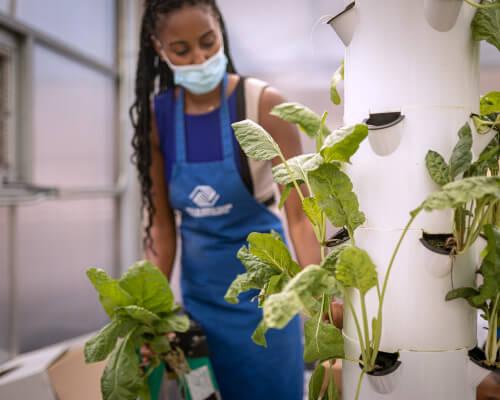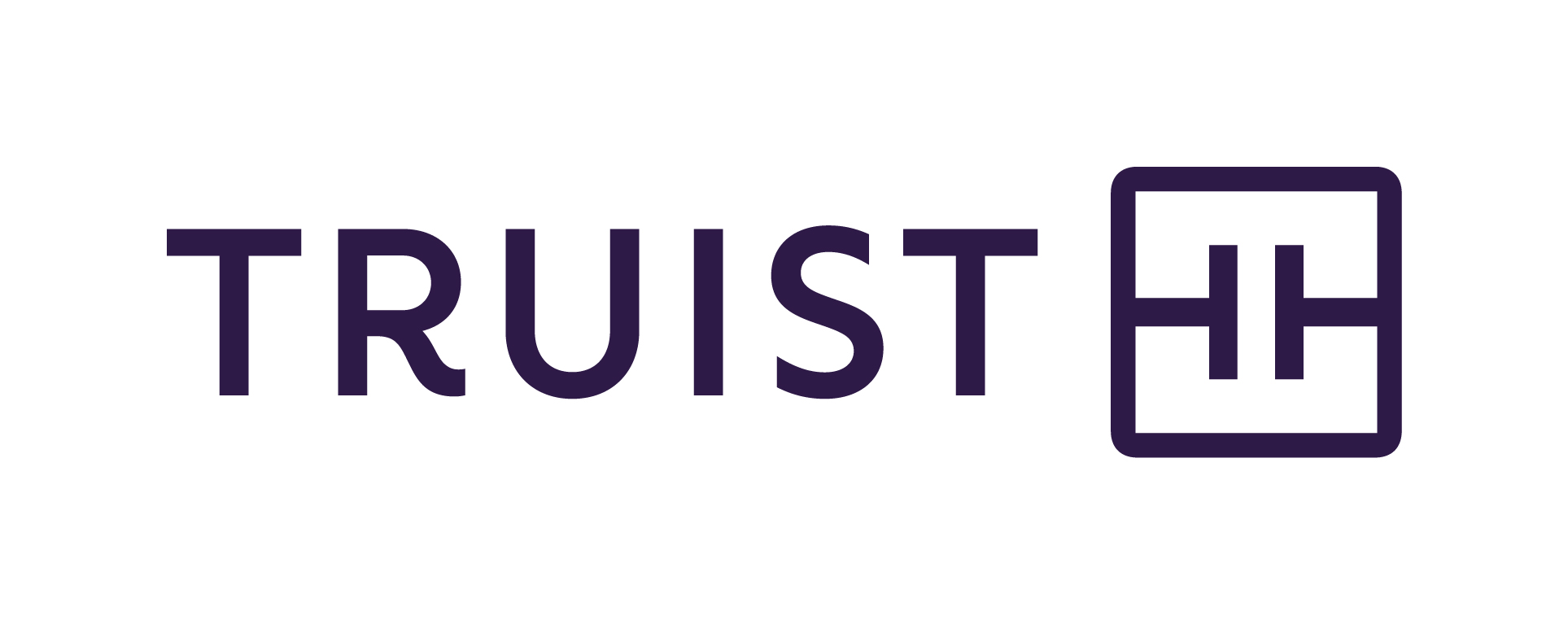Feeding Kids and Fueling Dreams During a Pandemic
Boys & Girls Clubs of America, a Truist Cares* grant recipient, continues to help underserved youth find comfort and hope when it’s needed most.
When schools across the country closed due to COVID-19, there was concern that as many as 30 million kids who rely on government-subsidized school meals could be left without access to those meals.
Typically, Boys & Girls Clubs fill the gap between school and home — either providing after-school or summer programming for more than 4.6 million kids annually — times when many kids are often left alone and at their most vulnerable. But as schools and summer programs closed due to the coronavirus, the nonprofit refused to stand idly by. Nearly 3,000 Clubs across the country stepped up to fulfill their purpose and nourish their communities, providing food, water, and necessary supplies, caring for families of first responders, creating virtual programming, and restoring a sense of safety for the kids.
“(The first) priority was safety,” says Keith Blanchard, CEO of Boys & Girls Clubs of Greater Memphis, “and the second was trying to figure out how we were going to do this financially. Many of our donors said they had to suspend funding. We had to cancel our biggest fundraisers. We lost $600,000–$700,000 in revenue. It was a scary time.”
Scary, especially considering that kids were in need more than ever before. According to a Harris Interactive survey, 54%† of Boys & Girls Clubs alumni say that the Club saved their life, and Blanchard knew this was a pivotal moment for the upcoming generation. The lack of supervision and resources due to school closures heightened issues like child abuse and neglect. New traumatic experiences due to the pandemic have made youth more susceptible to mental health issues. Academic gaps widened and access to technology became an issue with remote learning. And with 61% of Club youth qualifying for free or reduced-price school lunches, many no longer had their primary source of basic nourishment.
“Truist was among the first organizations to give,” says Jim Clark, President and CEO, Boys & Girls Clubs of America. The national nonprofit distributed the funds across hundreds of Clubs in underserved communities across the country — and that meant that more facilities could stay open, more staff would remain employed, and, according to Boys & Girls Clubs, more than 113,000 youth† could be served in places where the need is greatest.
For the Memphis Clubs, Blanchard says the grant meant being able to keep on 36 full-time staff who they otherwise may not have been able to. In addition, they purchased personal protective equipment (PPE) and prepared their facilities so they could continue serving kids during the pandemic.
More than just mealsIn Memphis, Boys & Girls Clubs have not just been feeding and caring for kids — they’ve continued to be mentors and teachers, and they’ve also made it possible for essential frontline workers to do their jobs at a time when they’re needed most. For example, Quin Kelly, culinary director of the Memphis Boys & Girls Clubs’ Juice Plus+ Technical Training Center (TTC), has been making more than 120 breakfasts every morning for the children of essential workers.
“We saw a report that said one in seven healthcare workers couldn’t go to work because of childcare,” says Kelly. “So, pretty quickly, we opened our first location to offer childcare services, which means feeding them. We were serving 20 kids at one location at first; that quickly expanded to four locations.”
For a child, not knowing where your next meal is coming from means you’re not dreaming of your future — and the future is exactly what Boys & Girls Clubs want their kids to focus on. The state-of-the-art TTC provides hands-on training in culinary arts, greenhouse farming, warehouse logistics, welding, information technology, and automobile mechanics and maintenance. Of all the youth who have graduated, 100% of attendees landed a job or went to college.Eighteen-year-old Phileta Jackson, one of Kelly’s mentees, has been working in the culinary center for over a year, learning everything from health regulations and catering logistics to recipe development and nutrition. Thanks in part to the Truist Cares* funding, the facility has been able to stay open this summer, meaning Kelly and her fellow mentors have been able to continue fulfilling their purpose of introducing Jackson and other youth to opportunities for growth.
“Last week,” says Jackson, “we made pesto pasta, and that was really fun because we got the chance to go to the greenhouse and harvest the basil ourselves. It was my first time harvesting an herb, so that was really cool.”
Developing skills for life
While one purpose of the training center is to offer hands-on learning, they also emphasize the importance of employability with skills like resume writing, goal setting, money management, and beyond. “I’m learning to cook,” says Jackson, “but I’m also learning discipline and better communication skills.”
“Phileta is cool with everyone,” Kelly says. “She’s quiet, but she’s a leader at heart. The first day we came back to in-person classes with social distancing in place, I was nervous. I wanted to make sure my class was successful. I decided we would work on knife skills, and Phileta already knew all of them! The other students could look to her, and that just put me at ease.”
Jackson says that she is learning from Kelly too. “I’ve learned that you have to be patient with cooking. You can’t rush things, and everything is not going to be perfect all the time, but you just have to keep going.” A valuable lesson learned during a challenging year.This fall, Jackson is continuing to pursue her culinary interests, majoring in food science at Alabama A&M University. “I want to be a chef because I’ve seen how I can use food to make people happy,” she says.
Investing in futures
According to the Memphis Boys & Girls Clubs, their technical training center is able to offer kids like Jackson more than $2,400 worth of hands-on learning for just $10. But the center may not have been open this summer without the Truist Cares* grant, which helped pay for its staff, PPE, and cleaning supplies.
“We can’t do what we do without partners like Truist to help us meet the needs of the local community,” Clark says. “The needs of each area are so varied, so they need the support of their local Clubs. So having this partnership, this support across time — not just during a crisis — is so important for the success of our kids.”
Building better lives through better partnerships is what Truist is all about.
“The work that the Boys & Girls Club is doing in Memphis has never been more critical in supporting children and teens within our market,” Johnny Moore, Mid-West Tennessee Regional President at Truist, said in an emailed statement. “That is why we’re proud to support the Memphis Clubs as part of our larger response to COVID-19 relief needs through our Truist Cares* initiative, which included a $2 million donation to Boys & Girls Clubs of America. Locally, that funding has helped BGCM keep 36 full-time workers employed and provided the necessary resources to serve youth safely amid the closure of schools and other support systems.”
“I am grateful that Phileta has this opportunity,” says Kelly, “because she’s going to be great. And it’s not necessarily because of Boys & Girls Clubs. She already had greatness in her, but Boys & Girls Clubs are the perfect recipe for kids like her.”
Truist is proud to be a part of resilient communities that motivate us to build better lives every day. Seeing how our community partners have stepped up in the face of COVID-19 inspired us to form the Truist Cares* initiative, a $50 million commitment to help support youth, seniors, the workforce, small businesses, and increased connectivity. For more stories about the work our partners are doing, visit truist.com/truistcares.
*About Truist Cares: Truist Cares is a cooperative effort between Truist Financial Corporation, Truist Foundation, Inc., and Truist Charitable Fund to provide communities, organizations and individuals disaster relief and assistance during the COVID-19 crisis.† Data provided by Boys & Girls Clubs of America
About Truist
Truist Financial Corporation is a purpose-driven financial services company committed to inspire and build better lives and communities. With 275 years of combined BB&T and SunTrust history, Truist serves approximately 12 million households with leading market share in many high-growth markets in the country. The company offers a wide range of services including retail, small business and commercial banking; asset management; capital markets; commercial real estate; corporate and institutional banking; insurance; mortgage; payments; specialized lending; and wealth management. Headquartered in Charlotte, North Carolina, Truist is the sixth-largest commercial bank in the U.S. with total assets of $504 billion as of June 30, 2020. Truist Bank, Member FDIC. Learn more at Truist.com.






